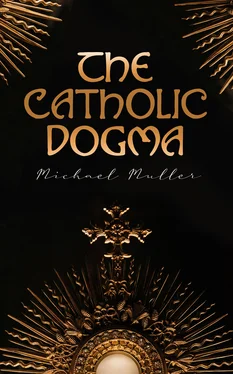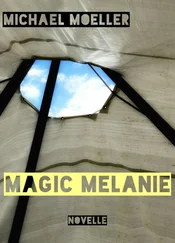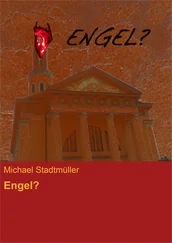Michael Müller - The Catholic Dogma
Здесь есть возможность читать онлайн «Michael Müller - The Catholic Dogma» — ознакомительный отрывок электронной книги совершенно бесплатно, а после прочтения отрывка купить полную версию. В некоторых случаях можно слушать аудио, скачать через торрент в формате fb2 и присутствует краткое содержание. Жанр: unrecognised, на английском языке. Описание произведения, (предисловие) а так же отзывы посетителей доступны на портале библиотеки ЛибКат.
- Название:The Catholic Dogma
- Автор:
- Жанр:
- Год:неизвестен
- ISBN:нет данных
- Рейтинг книги:4 / 5. Голосов: 1
-
Избранное:Добавить в избранное
- Отзывы:
-
Ваша оценка:
- 80
- 1
- 2
- 3
- 4
- 5
The Catholic Dogma: краткое содержание, описание и аннотация
Предлагаем к чтению аннотацию, описание, краткое содержание или предисловие (зависит от того, что написал сам автор книги «The Catholic Dogma»). Если вы не нашли необходимую информацию о книге — напишите в комментариях, мы постараемся отыскать её.
The Catholic Dogma — читать онлайн ознакомительный отрывок
Ниже представлен текст книги, разбитый по страницам. Система сохранения места последней прочитанной страницы, позволяет с удобством читать онлайн бесплатно книгу «The Catholic Dogma», без необходимости каждый раз заново искать на чём Вы остановились. Поставьте закладку, и сможете в любой момент перейти на страницу, на которой закончили чтение.
Интервал:
Закладка:
"There are, we like to believe, among Protestants, many individuals who are far superior to their Protestantism, who have not yet learned to distrust reason, who hold that truth is obligatory, that religion is the law of conscience, who are honest, upright, kind-hearted, and benevolent according to their light, and who mean to be true Christian believers. These can be reasoned with and be more or less affected by argument; but they are not genuine Protestants. They may not very well understand the doctrines retained from the Church by the early reformers, but they believe them to be revealed truths, which it would be sinful in them to deny, not mere opinions which one is free to hold or not, hold according to his pleasure. These serve to keep up a show of religion in the several Protestant sects, but they are not governed by the Protestant spirit, and if carried away, by the Protestant movement, they are not its leaders. They are the laggards in the onward march of Protestantism. You find some of them in Geneva, who in earnest condemn the measures adopted by the Council against Bishop Mermillod and the Catholic clergy; some, like Herr von Gerlach, in Prussia, who resist with all the means in their power the legislation demanded by the government against the Church and her faithful pastors; and a small number even in this country who openly oppose the iniquity of taxing Catholics for the support of schools to which their consciences forbid them to send their children. It is not these, as men, as individuals, that we denounce, for many of them we honor and esteem, but the Protestantism with which they are associated.
"That Protestants, that so-called orthodox Protestants at least, profess to hold, and claim as belonging to their Protestantism, many things that are also held by Catholics, nobody denies; but these things are no part of Protestantism, for the Church held and taught them ages before Protestantism was born. They are part and parcel of the one Catholic faith, and belong to Catholics only. Protestants can rightfully claim as Protestant only those things wherein they differ from the Church, which the Church denies, and which they assert; that is, what is peculiarly or distinctively Protestant. We cannot allow them to claim as theirs what is and always has been ours; we willingly accord them their own, but not one whit more. All which they profess to hold in common with us is ours, not theirs. Adopting this rule, which is just and unimpeachable, nothing in fact is theirs but their denials, and as all their denials are, as we have seen, made on no Catholic principle or truth, they are pure negations, and hence Protestantism is purely negative, and consequently is no religion, for all religion is affirmative.
"Nor is this all. We have seen that the Protestant denials, in both their logical and historical developments, lead to the denial of all dogmatic religion, of all objective truth, and reduce the truths of reason and of revelation to mere personal opinions, and therefore involve the denial of those very doctrines which Protestants profess to hold in common with us. The immense majority of Protestants will give up these doctrines, or consent to hold them simply as opinions with no objective authority, sooner than desert the Protestant movement or reject the denials which are the essence of Protestantism, if we may speak of the essence of a negation, which has no being in itself or elsewhere. A few of the laggards may be occasionally captured, but most of them will quicken their pace and close up with the main body. Individual conversions, indeed, are made, which the in aggregate are considerable, but which are little more than the dust in the balance compared with the whole number of Protestants, and are by far outnumbered by the Catholics who lapse, here and elsewhere, into Protestantism or infidelity.
"It is obvious, then, that to carry on a controversy Protestants, as if they were Christians simply erring as to some portions of the Christian faith, can effect nothing. They cannot be convinced by argument, for they hold firmly nothing which can serve as the basis of an argument. It seems to us much more important to strip them of all Christian pretensions, to deprive them of their prestige and the power of seduction which their Christian profession gives them, by showing them up in their utter nakedness as downright infidels, than to labor to make them accept the Catholic doctrines they avowedly reject. Infidels they are, and it is of no little importance to let it be seen that no man can be a Protestant and be at the same time a Christian or follower of our Lord and Saviour Jesus Christ. We owe this to uninstructed or imperfectly instructed, and especially to our worldly-minded Catholics, who are exposed to Protestant influences and seductions, and who would recoil with horror from open and undisguised infidelity or denial of the Lord who has bought us, and yet be tempted to fraternize with Protestants who pretend that they are Christians, and hold the essentials of the Christian faith, if they find that Catholics themselves concede that Protestants are Christians, though heterodox Christians. We owe it also to those who, in the ranks of Protestants, feel themselves bound to be Christians, and would fain be Christians. Both classes should be made to understand what is true, that Protestantism is not Christianity, is not religion, but is, when pushed to its last consequence, the denial of revelation, the denial of reason, the denial of God, the author of reason, and only a disguised atheism, or subtle form of universal negation or nihilism. Every honest Protestant should, as far as possible, be made to understand this, so that he may understand the risk he runs if he remains in the ranks of Protestants; and every Catholic should be made to understand it, so that he may see clearly that, if he yields to the seduction of Protestantism, he severs himself completely and entirely from Christ our Lord, and insures his eternal perdition.
"We know nothing more reprehensible than the mambypambyism babbled by sentimental Catholics about the good faith of ‘our separated brethren.’ There may be persons in good faith amongst Protestants, but, if so, they do not lack opportunities of showing it, and of coming out from the Babylon in which they have been reared. Men cannot be saved without Christ, for there is no other name given under heaven whereby they can be saved. Without faith it is impossible to please God, and he that cometh to God must believe that he is, and is the remunerator of them. that seek him; and how can those be saved by Christ who adhere to the party that rejects him and makes war on him. And how can they have faith or believe in God who commune with those who resolve all faith, all belief, all truth, indeed, into a mere opinion, or an inward sentiment, varying with each individual? If Catholicity in Christian, if reason is authoritative in its own province, nothing is more certain than that Protestantism is in no sense Christian, and that persons living and dying Protestants cannot be saved. It is a stultification of common sense to maintain the contrary, and besides, it practically neutralizes all our efforts to convert Protestants, and to bring them to a living and saving faith in Christ.
"We know what theologians say of invincible ignorance and we do not contradict them: Invincible ignorance excuses from sin in that whereof one is invincibly ignorant; but it gives no faith, no virtue; and without faith, without positive virtue, no man can be saved. The man who holds implicitly the Catholic faith, but errs through invincible ignorance with regard to some of its consectaria, and even dogmas, may be saved; but how can a man be said to hold implicitly the Catholic faith, who holds nothing, or rejects every principle that implies it? It is not safe to apply to Protestants, who really deny everything Catholic, a rule that is very just when applied to sincere but ignorant Catholics, or Catholics that err through inculpable ignorance. Protestantism does not stand on the footing of ordinary heterodoxy, it is no more Christian than was Greek and Roman paganism.
Читать дальшеИнтервал:
Закладка:
Похожие книги на «The Catholic Dogma»
Представляем Вашему вниманию похожие книги на «The Catholic Dogma» списком для выбора. Мы отобрали схожую по названию и смыслу литературу в надежде предоставить читателям больше вариантов отыскать новые, интересные, ещё непрочитанные произведения.
Обсуждение, отзывы о книге «The Catholic Dogma» и просто собственные мнения читателей. Оставьте ваши комментарии, напишите, что Вы думаете о произведении, его смысле или главных героях. Укажите что конкретно понравилось, а что нет, и почему Вы так считаете.












